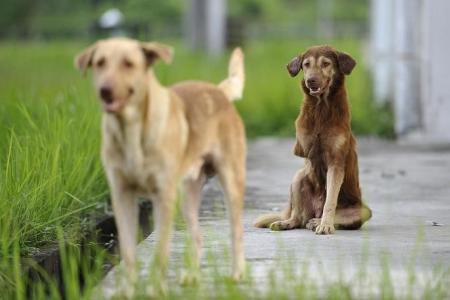80% of stray dogs sterilised under government programme
A programme to manage the population of stray dogs by trapping and neutering them will be extended, after it sterilised 80 per cent of these animals in five years, National Development Minister Desmond Lee said on Friday.
In a Facebook post, he said the Trap-Neuter-Rehome/Release-Manage (TNRM) programme by the Animal & Veterinary Service (AVS) started with an “ambitious goal” to sterilise more than 70 per cent of free-roaming dogs in Singapore within five years.
Since it was launched in November 2018, the programme has sterilised about 80 per cent of the free-roaming dog population, said Mr Lee.
The TNRM programme adopts a four-step approach to trap, neuter, rehome or release, and manage the population of stray dogs.
More than 4,000 dogs have been neutered so far. Of these, 1,891 were rehomed, and 709 pups were fostered or sheltered.
The 1,347 dogs that could not be rehomed, sheltered, or fostered were released to suitable locations where they could live naturally, said Mr Lee.
He added that the TNRM programme was developed following an April 2014 study trip to Australia, where plans were sketched out to “trap and sterilise free-roaming dogs in Singapore using a science-based approach”.
Public feedback on free-roaming dogs has dropped by 70 per cent since the launch of TNRM, from an average of 186 complaints each month in 2018, to fewer than 49 a month as at September 2023.
In his post, Mr Lee also thanked partner animal welfare groups such as the Society for the Prevention of Cruelty to Animals (SPCA), Action for Singapore Dogs (ASD), Causes for Animals – Singapore, and SOSD Singapore.
“AVS will continue to work closely with our partners to sterilise and rehome even more of our free-roaming dogs,” said Mr Lee.
Animal welfare groups said they agreed with the move to extend the TNRM programme.
SPCA executive director Aarthi Sankar said the programme has made significant strides in sterilising about 80 per cent of the free-roaming dog population, but this work can be undone if the efforts are not continued.
Agreeing, Action for Singapore Dogs president Ricky Yeo said: “In fact, we have to double our efforts as it will be harder to trap (the remaining unsterilised dogs) as they are likely better at evading capture and have better survival instincts.”
Ms Christine Bernadette, a volunteer with Causes for Animals – Singapore, said more should also be done to educate members of the public, so they will be able to co-exist with stray dogs.
“If the dogs are complained about and trapped and they cannot be rehomed, they end up being relocated elsewhere,” she said. “They end up susceptible to fights with existing packs in the new areas, and there might be less food in the new areas as well.”
Ms Malina Tjhin, co-founder of SOSD, said the TNRM programme is the only “humane and effective method to control the stray dog population”, and should be continued as there are still unsterilised stray dogs that are breeding.
She added that more should be done to find the source of stray dogs, many of which are from industrial sites.
She suggested that owners of factories or construction sites be held “accountable to not only license but also sterilise the dogs on their premises”.
The AVS told The Straits Times that it is looking to expand the TNRM programme to community cats, adding that details will be shared when they are ready.
Get The New Paper on your phone with the free TNP app. Download from the Apple App Store or Google Play Store now


